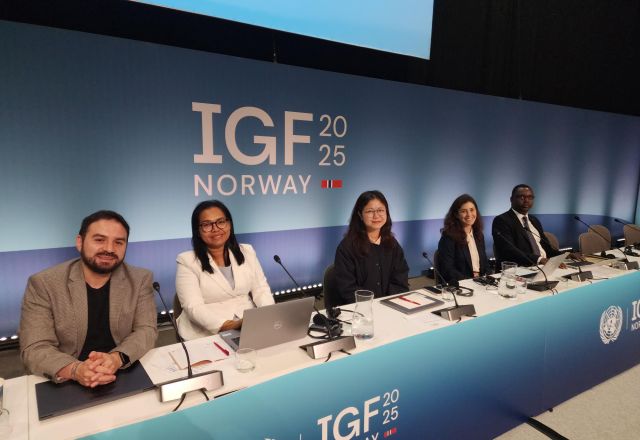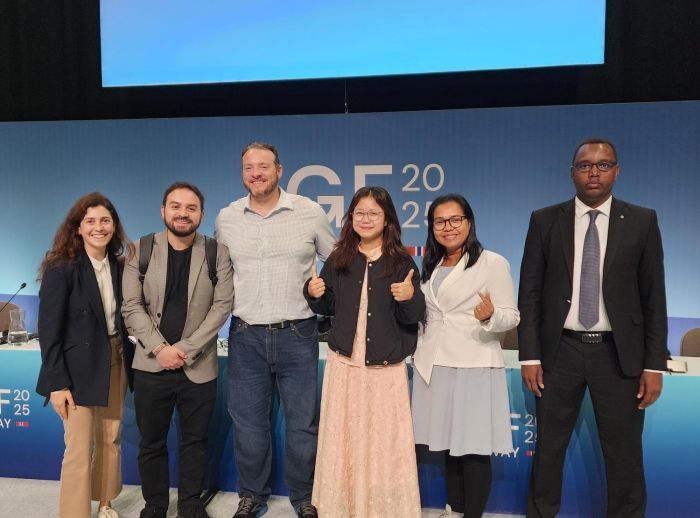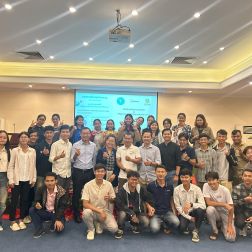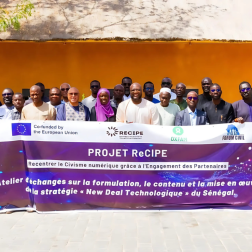
- 4 mins read time
- Published: 21st July 2025
Shaping a more equal digital future
Key takeaways from the 20th annual Internet Governance Forum

The message from the recent 20th annual Internet Governance Forum (IGF) was clear. Digital governance is a challenge that demands collective thinking and inclusive governance driven by people’s needs and fundamental rights.
It is about taking a holistic approach to change that looks at how technology can serve the public good and the planet, not just corporate interests. If we are serious about ensuring an accountable digital future, we must put the viewpoints and perspectives of the people impacted by today’s digital inequality at the centre. With the growing role of digital technologies in people’s daily lives, we must act now.
What is the IGF?
How the internet and other digital technologies are managed has a direct impact on people’s daily lives. These technologies are increasingly used around the world and they impact our rights, both online and offline. The IGF is a global platform convened by the United Nations to discuss policies and practices related to the evolution, use and accountability of digital technologies. The IGF involves governments, the private sector, the technical community, international organisations and civil society. With our partners under the ReCIPE (Recentering the Civic Internet through Partner Engagement) project, we participate in the IGF to ensure strong civil society representation in these discussions.
What insights emerged from the 20th annual IGF?
On technology
Many sessions during the event highlighted the importance of using technology to advocate for, defend and exercise human rights. There was also agreement that a responsible use of technology can help address some of the most pressing global challenges such as the climate crisis.
Yet, in an increasingly unequal and unfree world, technology is also used to violate rights, especially those of people who are already being left behind. It is important to think about what technology can help us achieve and also how to avoid its misuse through rights-respecting laws and policies. The rapid rise of artificial intelligence (AI) – a technology everyday people are only beginning to use, much less understand – increases the urgency with which human rights in a digital age must be prioritised.
On power
It is clearer than ever that digital technologies, particularly in the absence of robust laws and policies, can worsen existing patterns of social, racial and economic inequality. There is a growing gap between those who are benefiting from digital technologies and those who are not. In an insightful intervention, Irish writer and technology policy expert, Maria Farrell, reminded us that we have a choice. We can stay locked into an unequal, transactional, siloed world shaped by a small number of big corporations and their extractive practices, or see that an alternative is possible. This can be done with bold collaboration that spaces like the IGF can foster.
The issue of corporate power and influence in this digital era must be treated as a growing emergency. The good news is that we already have some of the tools that can help us do so, like antitrust law and competition policy. Stronger enforcement actions by public authorities against tech giants are finally compelling companies to make major shifts to their products and businesses. Still too often, tech giants take advantage of the international tax architecture with the greatest tax revenue losses affecting low and middle-income countries. Fiscal reform is another important tool to help redress the power dynamics of the digital era.
On people
Accountable governance of the internet and other digital technologies isn’t just a technical issue. It's about fostering inclusive digital economies and societies in which all people have equal opportunities to participate in the digital world.
As our partners demonstrated during the IGF session hosted by Oxfam, civil society organisations work with some of the people most affected by digital harms and risks. They play a key role in helping people to understand their digital rights as well as in holding governments and private tech companies accountable for digital rights violations. The meaningful, safe and inclusive participation of civil society and representative groups is essential when it comes to decision-making on digital technologies.
Where do we go from here?
We will continue raising the voices of our partners and the people we work with in national, regional and global level discussions where digital governance is being shaped. Our aim is to ensure these discussions lead to real solutions for people facing digital inequality and help achieve a more equal digital future. You can learn more about how we are doing so on the ReCIPE project website.


